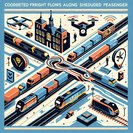
Brussels – In a lively Flemish-Parliament debate on 6 November, Mobility Minister Annick De Ridder defended the use of radar-detection app Flitsmeister, arguing that it nudges drivers to respect speed limits and therefore enhances road safety. Police unions, the traffic-safety institute VIAS and bereaved-parents’ groups have demanded a ban on the app’s advertising, claiming it encourages speeding until cameras loom.
De Ridder countered that enforcement only works when motorists buy in, likening Flitsmeister’s alerts to the graduated-speed signage used on smart motorways. She promised to reinstall average-speed-check notice boards to reinforce the message.
![Flemish mobility minister backs radar-warning app, rejects calls for a ban]()
Coalition partners Vooruit and CD&V accuse the minister of undermining Belgium’s “Vision Zero” plan to eliminate traffic deaths by 2050. They want a study on whether the app reduces compliance once drivers leave camera zones.
For mobile employees and cross-border commuters, the debate signals that Belgium will not follow France or Switzerland in outlawing radar-warning services, at least for now. However, provincial road-safety agencies may tighten rules on where such ads can appear, especially on publicly owned buses and trams.
De Ridder countered that enforcement only works when motorists buy in, likening Flitsmeister’s alerts to the graduated-speed signage used on smart motorways. She promised to reinstall average-speed-check notice boards to reinforce the message.

Coalition partners Vooruit and CD&V accuse the minister of undermining Belgium’s “Vision Zero” plan to eliminate traffic deaths by 2050. They want a study on whether the app reduces compliance once drivers leave camera zones.
For mobile employees and cross-border commuters, the debate signals that Belgium will not follow France or Switzerland in outlawing radar-warning services, at least for now. However, provincial road-safety agencies may tighten rules on where such ads can appear, especially on publicly owned buses and trams.






